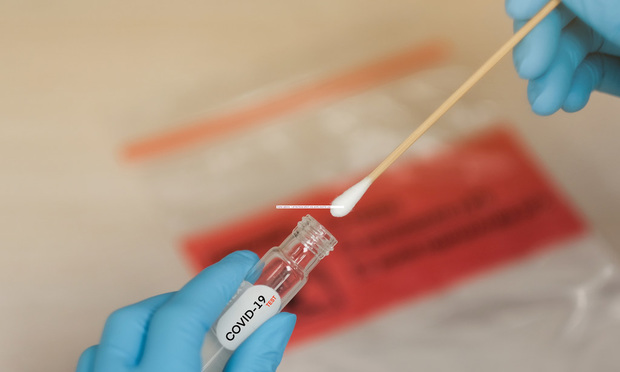 "This is a HUGE ask that doesn't seem to take into account the overall strain it will put on the already burdened health care system," says Jennifer Spiegel Berman of MZQ Consulting.
"This is a HUGE ask that doesn't seem to take into account the overall strain it will put on the already burdened health care system," says Jennifer Spiegel Berman of MZQ Consulting.
Private health insurers must cover up to eight at-home COVID-19 tests each month beginning on Jan. 15, the Biden administration announced.
"This is all part of our overall strategy to ramp up access to easy-to-use, at-home tests at no cost," Xavier Becerra, Secretary of Health and Human Service, said, according to ABC News. "By requiring private health plans to cover people's at-home tests, we are further expanding Americans' ability to get tests for free when they need them."
Recommended For You
Insured Americans will be able to either purchase home testing kits for free under their insurance or submit receipts for reimbursement, up to the monthly per-person limit. A family of four, for example, could be reimbursed for up to 32 tests per month. PCR tests and rapid tests ordered or administered by a provider will continue to be fully covered by insurance, with no limit.
"There is no question that making more OTC COVID-19 testing available to Americans at a lower cost is important," says Jennifer Spiegel Berman, Chief Executive Officer with MZQ Consulting. "However, the new rules place a huge administrative and financial burden on health plans—with only a 5-day long implementation period. While it's heartening to see such faith put into the private sector—this is a HUGE ask that doesn't seem to take into account the overall strain it will put on the already burdened health care system."
insurers are equally concerned about the logistics that will be involved in implementing the requirement. "There's no question that in this public health crisis, Americans need access to COVID-19 tests," said Blue Cross Blue Shield Association President and CEO Kim Keck in a statement. "We appreciate the administration's efforts to address this challenge, including measures to protect against price gouging and abuse. That being said, we are concerned that the policy does not solve for the limited supply of tests in the country and could cause additional consumer friction as insurers stand up a program in just four days' time. We will continue to partner with the administration and retailers to help make this work and advocate for policies that promote affordable and equitable access."
Although Biden announced the federal requirement late last year, the administration only now released details of the plan. The administration is trying to incentivize private insurers to cover the tests upfront, without a cumbersome reimbursement process. Insurance plans that work with pharmacies and retailers to cover the upfront costs of the tests will be required to reimburse only up to $12 per test if purchased through an out-of-network retailer. Plans that don't move proactively to set up a network of pharmacies would have to cover the full retail price that the customer paid, which could be more than $12 per test.
The insurer-covered testing would reduce costs for many Americans, and the administration hopes that by easing a barrier to more regular at-home testing, it can help slow the spread of the virus, get kids back into school more quickly and help people gather safely.
"For consumers, this guidance is welcome news," says the Phia Group's Brady Bizarro. "For employers and insurers, though, this guidance poses numerous challenges. Most obviously, they will face the same supply shortages and potential price gouging that consumers face.
"While the administration envisions scenarios in which employers can establish agreements with local pharmacies and retailers to pay for OTC tests at the point of sale, it seems unlikely that many pharmacies and retailers will agree to engage in such arrangements," Bizarro continues. "Most pharmacies and retailers are struggling to keep their shelves stocked with tests, and when they do order more, the price seems to continually rise. Therefore, it will be difficult for these entities to guarantee an employer a certain supply or pricing arrangement."
President Joe Biden faced criticism over the holiday season for a shortage of at-home rapid tests as Americans traveled to see family amid the surge in cases from the more transmissible omicron variant. "In response, the administration announced that it plans to make 500 million OTC COVID-19 tests available to Americans sometime in January," Bizarro notes. "That said, these tests will not be shipped to Americans until after this guidance takes effect. For employers, having the government purchase tests in bulk and mail them to Americans' homes directly would alleviate many of the pressures they will now face due to this guidance."
© 2025 ALM Global, LLC, All Rights Reserved. Request academic re-use from www.copyright.com. All other uses, submit a request to [email protected]. For more information visit Asset & Logo Licensing.









